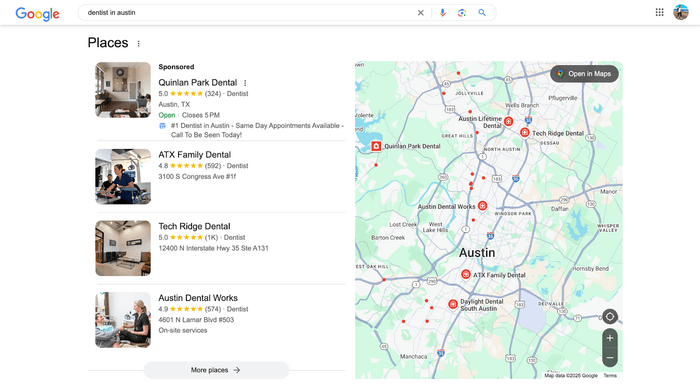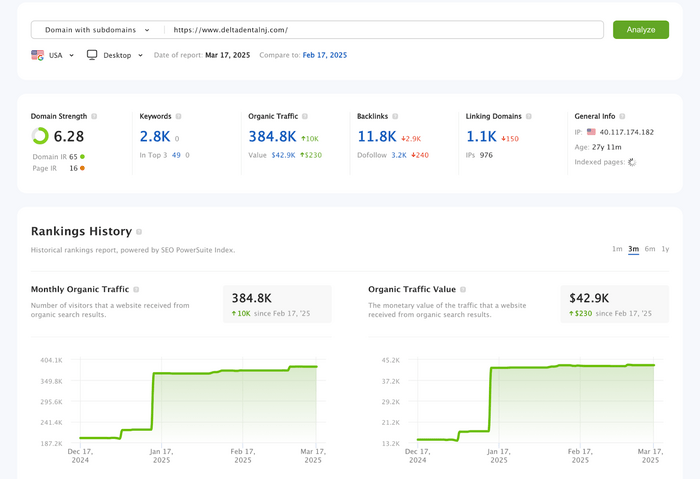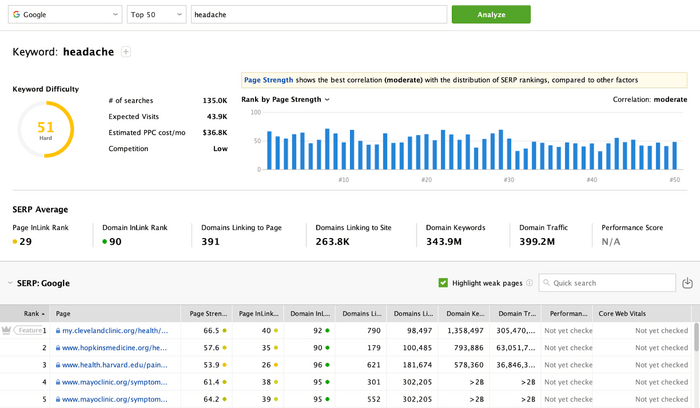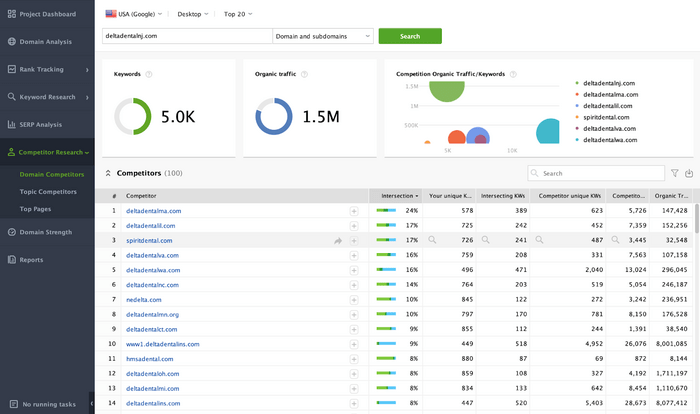The Ultimate Guide to SEO for Healthcare

When patients need medical help or health information, their journey usually begins online. In fact, most of them turn to Google first.
But here's the catch: if your healthcare website doesn't show up prominently in those crucial search results, you're effectively invisible—losing potential patients to competitors who rank higher.
This is where Healthcare SEO steps in. By strategically optimizing your content, site structure, and online presence to meet Google's high standards for expertise, authoritativeness, and trustworthiness (known as E-E-A-T), you ensure your practice is not only found—but trusted.
Effective healthcare SEO can elevate your website above the noise, making your practice the clear choice for patients seeking care.
In today's guide, I'm going to walk you through the essentials of healthcare SEO, breaking down exactly how to boost your site's visibility, attract more patients, and stand out in a crowded digital landscape. You’ll learn practical strategies to optimize your website, master local search, navigate Google's latest algorithm updates, and accurately measure your SEO success.
Let’s get started!
What is Healthcare SEO?
Healthcare SEO is the process of optimizing your healthcare website to appear prominently in search engine results when potential patients look for medical services, providers, or health-related information.
In simpler terms, it’s about making sure your website is easily found by patients when they're actively seeking care or answers to their health concerns.
Healthcare SEO combines multiple strategies, including content creation, technical website improvements, local visibility enhancements, and building online credibility.
Because healthcare falls into Google's "Your Money or Your Life" (YMYL) category, search engines hold these websites to exceptionally high standards. To rank highly, your content must clearly demonstrate expertise, authoritativeness, and trustworthiness (E-E-A-T).
Why Healthcare SEO matters
In today's digital world, your potential patients rely heavily on search engines to find healthcare providers, schedule appointments, and make informed health decisions.
Research shows that more than 80% of people turn to Google first when seeking medical information or services. If your website isn’t prominently visible in these search results, you risk losing potential patients to competitors who rank higher.
Healthcare SEO matters because it directly influences patient decisions. Patients typically trust websites appearing at the top of search results, associating these rankings with credibility and reliability. By investing in healthcare SEO, you enhance your visibility, build greater trust with patients, and ultimately grow your patient base.
Moreover, healthcare SEO is a cost-effective, long-term strategy. Unlike paid ads that require ongoing investment, a well-optimized website continues to generate high-quality organic traffic without ongoing advertising costs.
Over time, healthcare SEO builds lasting authority for your practice, creating a sustainable source of patient inquiries and appointments.
In short, healthcare SEO isn't just about ranking higher—it’s about positioning your practice as a trustworthy, authoritative choice in the eyes of both Google and your patients.
Why Healthcare SEO is essential for your practice
Dominate local search results
When looking for medical care, patients often search using location-specific queries—like “dentist in Austin” or “urgent care near me.”
Healthcare SEO helps your practice appear prominently for these targeted, local searches.
By optimizing your website for geographic-specific keywords and creating a robust local online presence, your practice becomes more accessible to patients nearby who are actively seeking the exact services you provide.
Rise above the competition
The healthcare industry is increasingly competitive, making SEO a vital investment.
Imagine a patient searching for a local healthcare provider. If your main competitor consistently ranks first or second, while your practice doesn't even appear on the first page, you're losing valuable opportunities for growth.
Effective SEO positions your practice above the competition. Combine this visibility with an outstanding digital experience, and you'll keep patients coming back.
Attract and grow your patient base
Today’s patients use search engines as their primary method for researching providers, booking appointments, reading reviews, and gathering health information.
By leveraging effective healthcare SEO strategies, your practice can secure a top position in these searches, ensuring you're highly visible exactly when potential patients need your services.
The higher you rank, the more trust you'll build, ultimately driving more patients to your door.
Start with a quick check of your status quo
Before diving into your healthcare SEO strategy, quickly assess your current SEO performance using Rank Tracker’s Domain Analysis. Simply enter your website URL into the tool, and you'll instantly see vital insights like organic traffic, keyword rankings, visibility trends, and competitor comparisons.
This quick analysis helps identify your site's strengths and areas needing improvement, guiding you toward smarter, more targeted SEO efforts.
16 actionable tips for your healthcare SEO strategy
Ready to enhance your healthcare website’s visibility and drive more patient engagement?
Below are 16 actionable tips designed to help your site rank higher, attract more patients, and establish your practice as a trusted authority in the healthcare space. Use these tips as a roadmap to guide your SEO strategy, helping you stay ahead of competitors and connect effectively with patients seeking medical care online.
1. Optimize your site for mobile users
More than 60% of searches come from mobile devices, especially in healthcare. Ensure your website uses responsive design, content loads smoothly on mobile screens, fonts are readable, and interactive elements are easily clickable.
Regularly audit your site's mobile usability and fix any issues affecting performance or usability.
2. Start with low-competition keywords
Instead of directly challenging giants for extremely competitive terms (such as "headache," which can attract over 135,000 searches monthly but has a very high keyword difficulty), it's smarter to initially focus your efforts on easier-to-win, long-tail keywords.
Long-tail keywords are specific, targeted search phrases that usually have lower search volume but significantly less competition.
Because large, established healthcare sites often overlook these niche phrases, smaller healthcare organizations can achieve meaningful results more quickly by focusing here first.
To further boost your chances, identify keywords that smaller websites are already ranking highly for. This method reveals valuable keyword opportunities your practice can realistically target—even with limited resources.
Starting your SEO strategy with these low-competition keywords not only helps you build steady organic traffic faster, but it also establishes your site's authority over time, setting you up to eventually tackle more competitive keywords and compete directly with healthcare industry giants.
3. Prioritize local SEO with Google Business Profile
Local SEO is vital because patients typically search locally—e.g., "dentist near me." Set up and fully optimize your Google Business Profile, including accurate contact details, clinic hours, quality photos, and engaging with patient reviews to enhance your visibility.
4. Improve your website’s loading speed
Patients often abandon sites that take longer than 2-3 seconds to load. Reduce your site's load time by optimizing image sizes, minimizing redirects, and removing broken links. A faster website not only boosts user experience but improves search rankings.
Regularly audit your website’s speed and technical performance. This helps identify slow-loading elements and optimize your site's performance quickly and effectively.
5. Create comprehensive, high-quality content
Content quality is critical for SEO, particularly in healthcare. Ensure your content thoroughly answers patient questions, is medically accurate, and provides clear value. Regularly publish blog posts addressing patient concerns and answering common questions to broaden your site's reach.
6. Make sure your website is fully accessible
Ensure your website complies with accessibility guidelines (like WCAG 2 Level AA), especially important in healthcare. Check readability, color contrast, navigation simplicity, and compatibility with assistive technologies to serve users with disabilities and elderly patients better.
7. Build website authority through backlinks
Backlinks are viewed by search engines as endorsements. Pursue quality backlinks by reaching out to authoritative health sites, medical publications, or local media whenever your organization or doctors are mentioned.
To monitor your backlink profile effectively, use SEO SpyGlass from SEO PowerSuite. It helps you analyze your backlinks’ quality, detect potential harmful links, and discover new opportunities for valuable link-building.
8. Set up Google and Bing Webmaster Tools
Use Google Search Console and Bing Webmaster Tools to track your site's performance on both search engines. Monitoring both gives you insights to optimize content, identify technical issues, and capitalize on easy SEO wins.
9. Monitor your SEO progress regularly
To measure success, track metrics such as your average search position, click-through rates, organic traffic growth, search impressions, and conversions. Consistent monitoring helps you quickly adapt your SEO strategies for better results.
SEO PowerSuite’s Rank Tracker allows you to monitor these essential metrics seamlessly, providing comprehensive reporting to fine-tune your strategies over time.
10. Benchmark your SEO against competitors
Your SEO success is relative to your competition. Use tools like Rank Tracker to compare your website’s performance against industry benchmarks and your direct competitors. Identify where you're lagging and focus your strategy on those specific areas.
11. Provide a seamless user experience
Your website should offer straightforward navigation, clear paths to booking appointments, and intuitive menus. This not only helps patients easily find what they're looking for but also makes your site easier for search engines to index, positively impacting SEO.
12. Showcase Expertise, Authoritativeness, and Trust (E-E-A-T)
Healthcare sites must clearly demonstrate expertise and reliability to rank well. Include detailed “About Us” and "Contact" pages, author biographies with credentials, clearly listed medical accreditations, privacy policies, and detailed contact information.
13. Include engaging multimedia content
Videos, images, and infographics can dramatically increase visitor engagement. This increased engagement sends positive signals to Google and helps your site rank higher. Videos that introduce your providers or explain procedures add both credibility and a personal touch.
14. Leverage patient testimonials and reviews
Positive patient testimonials and reviews significantly influence trust and SEO. Display testimonials prominently, encourage patient reviews on Google, and respond promptly to reviews—especially negative ones—to enhance credibility.
15. Use Structured Data Markup (Schema)
Structured data helps search engines better understand your content. Utilize healthcare-specific schema markup to enhance your website’s appearance in search results, potentially earning you featured snippets, knowledge panels, and richer organic listings.
16. Stay current with Google algorithm updates
Google continually adjusts its algorithm, particularly for healthcare sites. Recent updates, such as Google’s Medic and Page Experience updates, emphasize quality, trustworthiness, and user experience. Keep your SEO strategy adaptive by regularly reviewing industry news and adjusting accordingly.
Conclusion: putting your healthcare SEO strategy into action
Healthcare SEO is more than just a technical marketing tactic—it’s an essential part of how patients find, trust, and ultimately choose healthcare providers online.
By investing in a comprehensive SEO strategy, you’re not only making your practice more visible but also building credibility, authority, and long-term patient loyalty.
Remember, healthcare SEO requires consistent effort, ongoing optimization, and regular adjustments based on performance data and algorithm updates.
Leverage the tips provided in this guid, and utilize SEO tools to streamline the process, track your progress, and refine your strategies for sustained success.
Start applying these actionable strategies today, and you'll position your practice to attract more patients, outshine competitors, and establish a trustworthy digital presence that both patients and search engines value.








